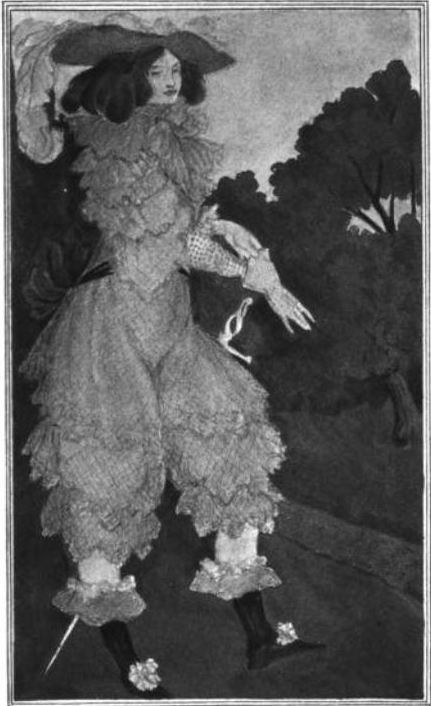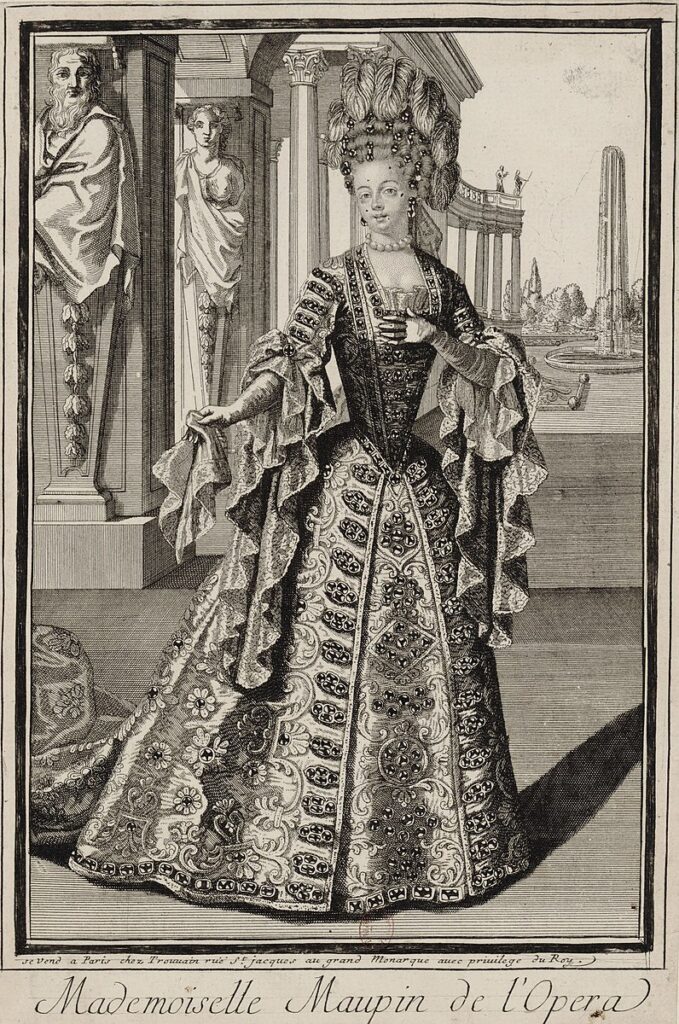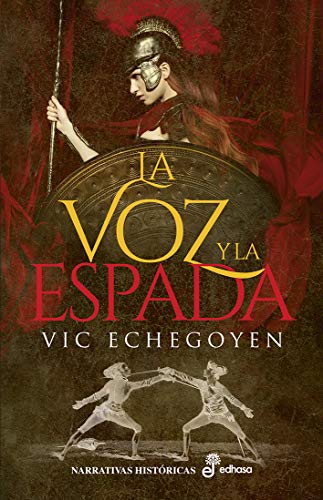This marks a new series here at Alejandra’s, with Interviews with people that I think deserve a spotlight just for them.
That’s the case of my good friend Vic Echegoyen.
Translator, Painter, Singer, Historian Buff and Writer of many books, I chose her to be my first interview (over e-mail), and decided to pick her brain about her new book “The Voice and The Sword”, originally written in Spanish (La Voz Y La Espada), and you can buy the copy at Amazon (book and e-book).
About “The Voice and The Sword” (La Voz Y La Espada)
This book is about the amazing life of Julie D’Aubigny. Woman of many arts (Fencing expert) and one of the greatest contralto Opera singer that is still spoken today between the opera connoisseurs with Opera’s written for her. Bisexual, lover of princes and a true fighter, Julie D’Aubigny is an absolute hero (or shero) to read.
In this novel, Echegoyen researched quite frankly a lot (you can read all the search references by the end of her book) and that created one of the best historical books I have read.
Interview:
Hi Vic, hope everything is ok in wonderful and beautiful Hungary were you have been in lockdown but always working.
During this lockdown you have started and ended a new novel available in Amazon called “The Easter of the Mouse” and finished a brand new novel that is waiting for your agent to confirm.
You work really hard, as I personally know, but that doesn’t mean that the passion for each book changes.
Each book of yours contains a hero/shero with such passion that, in my truly honest opinion, we as readers cannot let go of the book. The engagement is so high that it becomes an obsession to finish reading the book, and then when the book ends we continue to think about the story we read. That is what I think, and love that it is like that every single book of yours.
About “The Voice and The Sword”

- Julia D’Aubigny – that real character of history that is our hero in the novel. How did you think about her? How did she come into your life? How do you relate to Julia?
I heard about her when I was a small child, because my Mum is an opera producer, and my stepdad was an opera tenor soloist, and Julia D’Aubigny is a myth and a legend among opera singers.
Julia was as famous, or infamous, as a rock star of our times – sex, drugs and rock-n-roll applied to her scandal-filled life perfectly – but she lived far more dangerously than any of them, because she broke many laws (she fought duels to the death with several enemies at once, and never lost) and many unspoken rules, as she seduced both men and women, princes and nuns, bandits and geniuses of her time, and was the muse that inspired many of their masterpieces, too.
- I noticed many facts were actually perfect (and by the end of your book you wrote a bibliography and I have to say that you researched a lot!). Do you always research facts for your books?
Oh yes! Research is the fundament, the walls and the roof of any historical novel, and especially the satyric ones, like Julia’s story, which I describe in “The Voice and the Sword” (“La Voz y la Espada”).
To bring to life a story, figures, fashions, unspoken rules and even the humour of past times to modern readers in a believable way, you need to be so familiar with them as to be able to write about it all without thinking, consulting a map or referring to the sources.
If I can’t “get” the jokes I’m writing about, or be moved by the poetry of that era, or feel as scandalized as those people did at the outrageous misdeeds done by Julia, how can I ever write convincingly?
Especially with a story as funny and hair-raising as Julia’s: if I told you that there was once a woman who could pass off as a male or a female, who was a child prodigy at fencing, who at fourteen became the lover of the most powerful man in France after the King; who at sixteen became an outlaw sentenced to death by the Sun King for her blood-curdling revenge on her rapists; who also set fire to a convent in order to abduct a nun she fell in love with, who seduced princes, field marshalls, musicians, and bandits, who stabbed herself on stage nearly to death during a premiere just to spite her princely lover, who played cat-and-mouse for twenty years with the Chief of the Police (reputed to be one of the smartest men of his time), and who moreover was the first-ever contralto diva of the Opera of Paris – and also fooled audiences into believing she was a castrato male singer… would you even believe such a person existed? That’s Julia, in a nutshell – and much more besides.
She was so extraordinary and unpredictable, and her exploits were so phenomenal, that she inspired many songs, pamphlets, and poems. She lived exactly as she pleased, loved whoever took her fancy, fought (and often beat up physically) whoever challenged her freethinking ways, and one day simply vanished from the face of the Earth at the height of her scandals and glory.
I believe that today, she would be shut in an asylum for insane people. She drove King Louis XIV mad with her shenanigans – she was the main suspect of stealing away his grandson, and even blackmailing the King about it – but she mostly got away with everything. The King was so amused by some of her escapades, he pardoned her life, welcomed her back to court, and invited her often to sing for him at his palace in Versailles.
- Julia was many things: Swordsfighter, singer, lover, bisexual. What was the main characteristic of Julia that makes her a hero for you? For example: for me it was the fact of swordsfighter, as it was mainly a men “thing” in a “man world” and everyone never gave the proper credit to Julia until she started to make justice by her own hands, sometimes at a high cost.
Her authenticity! Whatever Julia d’Aubigny did, whether it was singing a new opera role that had ruined the voice of other divas, or dueling against three or four men at once, or risking her life to save innocents from the gallows, smuggling them out disguised as a Gypsy, a prostitute or a soldier, a hundred years before the Scarlet Pimpernel did it –she always gave it her best.
Nevermind she often assumed different identities and always fooled people into believing she was someone and something she wasn’t – she always stayed true to her principles and was a true friend, and gave herself body and soul to her lovers, who often broke her heart.
She was a destitute, an orphan who rose from obscurity to the pinnacle of Versailles’ splendor thanks to her spunk, originality, and perfectionism; and, no matter how terrible the blows were that she suffered from enemies and lovers alike, she never lost her sense of fun or her love of freedom. Also, she is a unique figure in History, maddening and delightful, immoral yet deeply honest, an artist-warrior with a rich and often conflicted personality. She was truly one of a kind.
- Talking about her sexuality: Which character was very decisive for Julia and her story? Seranne? Maupin? Armagnac? (not being spoiler with names). Can you explain a little bit about them and how you think (briefly) they were and what traits that each one of them had.
I think Julia learned to live, fight and not give a damn mostly from her Dad – an excellent swordfighter who was doomed by his violent, brooding temper and drinking habit – but each of her lovers gave her a gift, and a curse.
Her first lover, a seasoned courtier, gave her a refined education, and a hunger for beauty and sex without taboos; her second, an outlaw, taught her to fight dirty, to be a homeless without starving, and to earn her living by singing in taverns; another one set free Julia’s latent bisexuality, and taught her to forgive, and so on.
Julia was a chameleon, and in turn gave as good (or as rotten) as she got!

- Julia – as the first contralto. How did you keep track of her songs and can you make a little playlist with the operas that Julia might have sung? So our readers can read the book (like me) while hearing the songs on the background.
Julia d’Aubigny lived from 1670 to 1705, a golden era for early opera: the opera of castrati and virtuosi, where geniuses like Lully, Händel, Purcell, Bach or Vivaldi reigned supreme, terrorizing singers and musicians with their technical demands, which are as difficult as circus acts, and are really difficult for a modern singer to perform. In those times, professional singers began to train already as children, at age six or seven, and often lived with their teachers, devoting most of the day to learn the many technical aspects of singing, as well as dancing, acting, etc.
But Julia’s career was exceptional in many ways; first, because her singing voice was so gravelly, even castrati couldn´t match her range; second, because she taught herself to sing by imitating tavern singers and then watching opera singers, and only took singing lessons much later in life; and third, she never learned to read music, because her memory was so phenomenal, she relied entirely on it to learn her arias by heart after only one rehearsal, and couldn´t be bothered to sight-read a music score. She was a perfectionist, but also a tomboy who loved to experiment, which is why many composers loved to write very special pieces for her which no other divas dared to sing!
The opera “Tancrède” and its main heroine, the warrior princess Clorinda, were written especially for Julia by André Campra; Élisabeth Jacquet de la Guerre wrote her piece “Judith” for her; the opera “La Vénitienne” was also written for her.
Throughout the novel, I have included many of her roles, as well as several bawdy songs she learned from her father, and during her singing stints in French taverns while she was an outlaw, like “Le bon Roi Dagobert”, “Chevaliers de la Table Ronde”, or “Au clair de la Lune”.
Tancrede: https://youtu.be/qBMJUeqR5Rc
La Vénitienne: https://youtu.be/iOFmWm-nAzY
Le bon Roi Dagobert: https://youtu.be/e5u4oWDKnDY
- La Reynie: Even though I am in love with the King Sun court, I never heard of La Reynie or the following lieutenant of police (not being spoiler). How did this role become so important in the time of King Luis XIV?
This is one of the most fascinating – and funniest – subplots in the novel. Paris was a dangerous place to live in during King Louis XIV’s times for several reasons: not just because of the many thieves, drunkards, murderers, child-snatchers, gangs and highly contagious prostitutes of both sexes, either ruled by the infamous “Court of Miracles” that held sway in the French capital since the Middle Ages or arrived from the provinces seeking quick, easy money, but also due to the frequent hunger riots of the common people, as well as the mutinous nobility or “Fronde” who had terrorized and threatened Louis XIV when he was a small child. This is why the King hated living in the capital, and as soon as he was an adult he left the Louvre, the Tuilleries, and the Luxembourg royal palaces, and built his fairytale palace of Versailles in the country, away from Parisian dangers, where he forced the court to reside alongside the royal family in order to keep them all under his control (nevermind that Versailles very soon became a hotbed for crime, intrigue, and mass poisoning, as attested by the famous Poison Affair).
So Paris was a dirty, dark, smelly, dangerous, insalubrious, ramshackle and hard to control capital, and it cried out for a police force that not only kept a firm grip on the rogue Parisians, its many criminal brotherhoods, its brothels, unauthorized libelous presses, illegal taverns, and gambling houses, but also its rebellious inhabitants. This was the nightmarish city that King Louis XIV instructed Marquis Nicholas de La Reynie, his newly appointed Chief of the brand-new Paris Police, to bring to heel.
La Reynie was an obsessive, methodical, unscrupulous genius, a workaholic who made it his business to know even the tiniest anecdotes that happened in and around Paris, and for this, he created from scratch a highly disciplined, professional, complex system of cops, spies, informants and whistleblowers he recruited in every prison, criminal gang, prostitute ring, and smuggling outfit – even inside Versailles, where he even got his men disguised as chambermaids to raid the waste-paper baskets, the perfume bottles and the kitchen rubbish from the King’s concubine’s rooms, and the Princes’ apartments, to the sleeping dorms of the palace’s servants. La Reynie also overhauled the penal system, wrote a police handbook, spent a lot of his time visiting incognito the taverns, brothels, bathing houses and prisons to hear the latest gossip first-hand, set a curfew, installed public lighting throughout the city, and demolished part of the medieval old city in order to make the streets wider, safer and cleaner. He wasn´t just Police Chief – he also passed justice, he supervised water supply, food supply, public works, the fire brigade, the weight and measures office, the printing presses both public and private.
In short, Police Chief La Reynie and Julia d’Aubigny clashed several times throughout her life – during the Poison Affair, her time as an outlaw when she was wanted for horribly crippling several young men who had wronged her, another time when she helped many so-called heretics to escape from certain imprisonment and death, another time when she broke the dueling ban by fighting on purpose under the Police Chief’s office window, and so on. They were natural enemies – and fought each other with gusto for twenty years!
- Time around Julia’s Life. For those that aren’t aware of what France, or even Brussels, around that time were going through. Was it a tough time and how did it get to that point. How did people live? One question is that How music was seen by everyone back then. In many historical novels, we see that music or singing was a normal thing, compared to nowadays.
It was tough times indeed, especially for a lonely and lovely woman. Paris was more dangerous than any Chicago slum in the Roaring Twenties, and Brussels had just been burned to ruins by King Louis XIV for no reason at all but to show his firepower: when Julia arrived in Brussels, its inhabitants had just managed to put out the firestorm that had razed the city due to the French mass cannon attack, and everything, from the royal palace to the churches, warehouses, and the marketplace, was reduced to a heap of stones. People slept in makeshift sheds in the streets, or flocked to the Governor’s gardens, where he built a huge refugee camp made of tents and fed and clothed them throughout the hardships of the first winter just after the city was destructed.
I have worked in Brussels for the last 12 years, and I was shocked at the still-standing reminders of that senseless devastation. The City of Brussels Museum, in the Grand’ Place, has a whole storey with oil paintings, engravings, and images that show all too vividly that terrible event. Researching that time, and retracing Julia’s steps through the razed city, was a deeply moving experience. But I also found many depictions and written accounts of the city inhabitant’s fighting spirit and incredible sense of humour: the Little Peeing Boy bronze statue, the Manneken Pis who even then was the city’s symbol, purportedly wrote insolent letters to King Louis, poking fun at his lousy artillery, and daring him to come back and finish his handiwork. I’d lived for years in that city, but it was when I read about their unquenchable spirit and naughty comebacks when I learned to love them!
Who was Gabriel Thevenard?
Thévenard was a typical figure of the times: a humble villager and kitchen boy whose father meant him to take over the family inn. Alas, the boy preferred the songs of the traveling hustlers to the roasting spit: one day, he stole Dad’s best frying pans, and ran away to follow his dream of becoming a singer.
He earned his keep as a cook, and fed hungry musicians who let him copy their sheet music, and taught himself to sing, like Julia. He was a simple, loving and trusting soul, the eternal optimist whose sole ambition was to cook and to sing.
He and Julia met on the road somewhere, when both were penniless and roofless vagabonds: his deep bass voice and his happy-go-lucky philosophy matched her deep contralto and devil-may-care attitude, so they became fast friends, then lovers, then singing partners (the title role in the opera “Tancrède” was written for him) – and also rivals, in a love-hate relationship that lasted forever.
I´m very fond of Gabriel Thévenard: to me, he embodies the simple, earthy lust for life and beauty depicted in Brueghel’s peasant feast paintings.
I had several people asking me online when was the release of the English version of “La Voz Y La Espada”. Now we are going through and historical time, as well as everything, stopped. Will there be a release of the book in English?
Who knows? I write novels both in Spanish and in English (like my latest, Medieval adventure, “The Easter of the Mouse”, about the Children’s Crusades), and I have already translated the first 100 pages of “La Voz y la Espada”, just for fun – but, as it’s got nearly 600 pages, it’ll either take a very long time… or an English-speaking editor who loves outrageous historical tales to fulfill that very dear wish of mine!
Thank you for your time to respond to our interview. To finish this interview, and if any of the readers have any questions about Julia or your books, where can we find you online? (twitter, FB or website links, etc)
Thank you, dear Alejandra, for this lovely opportunity!
I am on Facebook and Twitter, and I have a website, too:
https://www.facebook.com/Vic-Echegoyen
https://twitter.com/VicEchegoyen



 Em Português
Em Português En Español
En Español